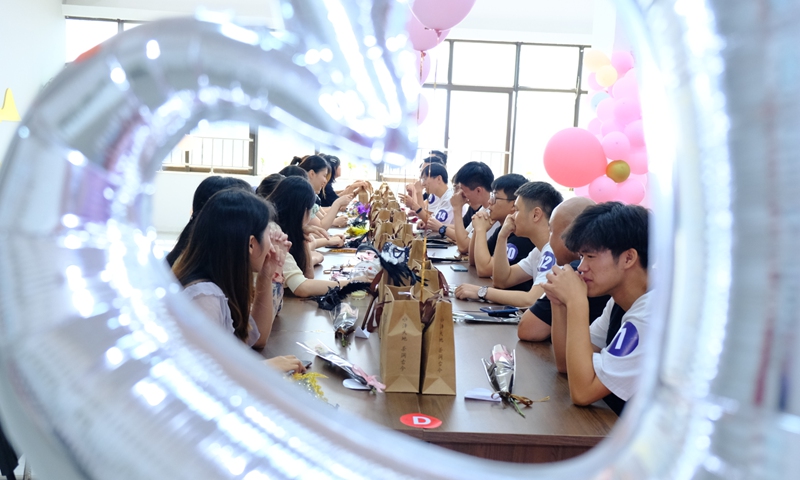Romance festival spending surges, pointing to China's steady recovery
Momentum cements nation's recovery amid new outbreaks

Young people at a Qixi matchmaking event in Hefei, East China's Anhui Province in August 2020
Buying beautiful flowers or chocolate for loved ones, going out for a luxury dinner, or staying at home after buying steak and wine online to celebrate the Qixi Festival, or the Chinese Valentine's Day, which fell on Saturday this year, Chinese consumers spent big during the popular day for young couples despite recent COVID-19 flare-ups.
While some consumers also showed reluctance in spending money amid certain restrictions due to a new wave of COVID-19 cases, the country's economic recovery continues to gain momentum, analysts said.
Vendors doing business highly related to the romance economy saw their turnover rise a week prior to the festival, one of China's major traditional holidays, which falls on the seventh day of the seventh month on the lunar calendar. There was a surge on the exact day of the festival, the Global Times learned.
A staffer at a popular Beijing-based steak restaurant told the Global Times on Sunday that it was fully booked days ahead of the Qixi Festival, and even those who lined up outside had little hope of securing a seat because continuous streams of customers entered.
Yuan Xiaohui, general manager of Nama Cocoa, a Chinese brand of handmade chocolate and ice cream, told the Global Times on Sunday that its chain store in Beijing's Wangfujing registered sales of 20,000 yuan ($3,087) on Saturday. That's twice the usual amount for a weekend day. Its sales on a normal working day could reach 7,000 yuan to 8,000 yuan.
"Our business was not that optimistic recently due to COVID-19 flare-ups in some parts of China, leading to lower traffic and consumption in the Wangfujing area, with sales of around 5,000 yuan per day on average," Yuan said.
Boosted by the surge for the Qixi Festival, Yuan said that domestic consumption still has huge room to grow. "Rising domestic demand and consumption upgrades will remain long-term trends," Yuan said.
The raw chocolate product provided by the vendor has relatively high value, starting from 138 yuan a box.
Flowers, an indispensable component of the romance festival, also witnessed surging orders.
A flower store owner surnamed Wang based in North China's Hebei Province told the Global Times that the store received at least 150 orders per day in the run-up to the Qixi Festival, while on regular days, orders total 10 to 15.
The Kunming International Flora Auction Trading Center, in Southwest China's Yunnan Province, a major supplier of flowers in China, traded over 80 million stems of fresh cut flowers starting from August 3, when the market began to prepare for Qixi, about double the previous year's level, the Xinhua News Agency reported.
Dashun, a Beijing-based flower vendor, told the Global Times on Sunday that sales of low- or medium-priced flower products were "not ideal" this year compared with previous years during the festival.
"People who only buy flowers during major traditional festivals like Qixi spent less this year, as they were more likely to opt for pragmatic ways to celebrate, for instance, enjoying a high-end meal in a fancy restaurant or buying gifts instead of flowers."
Wang said that the latest wave of COVID-19 outbreaks in China put many people with less purchasing power "on hold," as they were reluctant to join the consumption bandwagon.
A report by JD Daojia sent to the Global Times on Sunday showed that due to stricter virus prevention and control measures in recent weeks, many lovers chose to spend their time at home for the romance festival. Sales of alcoholic beverages, seafood, partly prepared meals, baked goods and other commodities increased significantly.
Sales of whiskey increased seven times year-on-year, and those of non-alcoholic beer increased 2.9 times, according to data from the platform.
JD Daojia provides consumers with two-hour delivery of products from local supermarkets and other partners through its location-based app.
Although the current tightening measures might have an impact on the economy for a short period, they won't affect the recovery in growth following the outbreak of COVID-19 last year, said Cong Yi, a professor at the Tianjin University of Finance and Economics.
"A review of the economic data starting from last year until now proves that China's economic stability has increased, and the contribution of consumption in driving the economy is obvious," Cong told the Global Times on Sunday, adding that consumption has been relatively stable amid ups and downs in the pandemic.
Although COVID-19 outbreaks have hit consumption, a report from McKinsey & Co showed that the sentiment, behavior and characteristics of Chinese consumers had returned to pre-epidemic levels as of March this year.
Cong predicted consumption will grow at least 6-8 percent this year, compared with the average level of 2019 and 2020 combined.
First-half retail sales, totaling 21.2 trillion yuan, were 9 percent higher than during the same period in 2019, underscoring the strong post-pandemic rebound, data from the National Bureau of Statistics showed in July.
Per capita consumption stood at 11,471 yuan, a nominal increase of 18 percent over the same period last year, according to the data.


